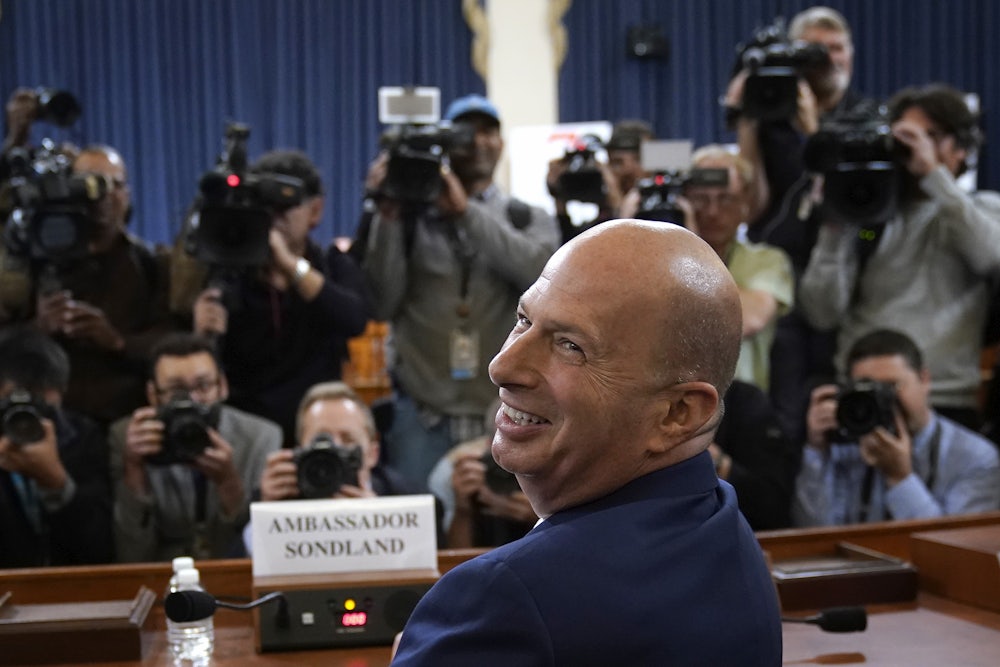If Hollywood producers were to cast a foil to Donald Trump, they seemingly could not do better than the witnesses who testified during the first three days of the House Intelligence Committee’s impeachment hearings. There was George Kent in his three-piece suit and colorful bow tie and Alexander Vindman in his full military uniform—the former exuding a genteel propriety, the latter a strict, unyielding rectitude. Vindman even made his uniform a centerpiece of his testimony. “The uniform I wear today is that of the United States Army,” he said. “We do not serve any particular political party, we serve the nation.”
It was a microcosm of the long-running battle that has been playing out between the president and his own government, or what he and his supporters call the “deep state.” On the one side, a vulgar president set on abusing his office; on the other, a cadre of earnest, geeky public servants bent on protecting the national interest. Political journalists love this contrast. The New Yorker’s Susan Glasser praised Marie Yovanovitch, the fired ambassador to Ukraine, for being “sincere and corny and old-fashioned in her insistence on the values that politicians often talk about but, in the Trump era, have more or less jettisoned.”
The fourth day of hearings, however, was altogether different. Gordon Sondland, who donated a million dollars to the Trump inauguration before being appointed the U.S. ambassador to the European Union, was not a walking civics lesson. He was not particularly dignified either, more Veep than The West Wing. Bearing a rakish grin and a bald head presumably bronzed under a tanning bed, he had the swagger of a very rich man who doesn’t lie awake at night thinking about the future of the American republic. And as he threw Trump and seemingly all his corrupt cronies under the bus, it became clear that his testimony might be the most effective of them all.
The career public servants who testified prior to Sondland made it clear that they were deeply concerned about the integrity of the nation’s democratic institutions, starting with the office of the president but also including the Washington bureaucracy. They were so concerned, in fact, that they had no choice but to come forward, even if they plainly took no pleasure in it. The contrast they formed with the president—who is only concerned about himself—could not be clearer, and the media narrative practically wrote itself.
The president’s assault on the machinery of American democracy is, no doubt, a major aspect of Trumpism, one covered again and again in magazines, op-eds, and Michael Lewis books. The often anonymous people defending democracy are frequently presented as embodying a kind of ideal that everyday voters admire. Trump, ever the cynic, believes voters feel differently. Three years into his administration, it’s obvious that “drain the swamp” was more about undercutting bureaucrats and destroying their institutions than it was about reducing corruption.
The early hearings, as a result, played out as a choose-your-own adventure with ready-made narratives, depending on one’s political persuasion. As The New Yorker’s Masha Gessen wrote last week:
In one, President Donald Trump is guilty of abusing power in many ways and on many occasions, and one such occasion is being dissected and laid out in great detail on national television. In the other America and the other set of hearings, Democrats are out to get Trump at any cost, have latched onto a muddled and inconsequential incident, and are laying it out in great detail on national television in the hopes of convincing the public that the President has done something wrong. These two realities do not overlap.
That changed with Sondland’s testimony. The career diplomats wanted to save the republic; Sondland wanted to save himself. If Vindman, Kent, and Yovanovitch could have been cast by Spielberg and Sorkin, Sondland seemed to step out of a scene from The Irishman. As a result, he was able to destabilize the “two realities” that have defined impeachment so far. Here was a Trump supporter, donor, and appointee having a grand old time as he stuck a shiv in every single one of his erstwhile allies. There was a quid pro quo, he said. It came on orders from the president, he said. I have the receipts, he said, brandishing texts and emails. Oh, and no one is innocent: “Everybody was in the loop,” he said. “It was no secret.”
There were times when he was not particularly credible. He argued, for instance, that he did not think that Trump’s order to go after Burisma, where Hunter Biden sat on the board, meant going after the Bidens, which is simply not believable given the evidence we have from Sondland himself. But his skeeziness did not really discredit his testimony—it bolstered it, because the whole thing is run on skeeze.
Much of the media coverage of the impeachment hearings has focused on the idea of persuasion: whether the hearings can convince Republicans and Trump loyalists to abandon the president and recognize what really happened in Ukraine. There has been some consternation that even a whole parade of upright public servants bearing damning testimony will be unable to do that. But all that hand-wringing says more about what the media thinks a hero should look like. In a city run by rats, Gordon Sondland might be the closest thing to a hero we’ll get.
